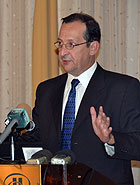| Source: Date: Updated: |
TheBahamasInvestor.com
Wednesday, October 26, 2011 Wednesday, October 26, 2011 |
 Earlier predictions that The Bahamas economy was set to grow by two per cent this year and 2.5 per cent in 2012 are “knife-edge,”?according to an International Monetary Fund (IMF) official who cautioned that any shock could shift the balance to “negative territory.”
Earlier predictions that The Bahamas economy was set to grow by two per cent this year and 2.5 per cent in 2012 are “knife-edge,”?according to an International Monetary Fund (IMF) official who cautioned that any shock could shift the balance to “negative territory.”
This is not only the case for The Bahamas, but for the rest of the world, according to Miguel Savastano (left), deputy director of the IMF’s Western Hemisphere Department. His comments came at Regional Economic Outlook panel discussion, the first of its kind in The Bahamas, hosted by the IMF and the Ministry of Finance.
The bi-annual Regional Economic Outlook, one of the IMF’s flagship publications, is not intended to be a long-term prediction of the world economy, says Savastano, rather it provides a snapshot of where things stand.
The IMF baseline predictions are based on certain key “assumptions.”
“This scenario rests on three critical assumptions that Europe is able to avoid a full crisis. The second assumption is that the US is able to strike a balance on fiscal policy and the third assumption is that emerging Asia–and China, in particular–continues to grow very strongly,” Savastano explained. “If these assumptions hold, the global economy is projected to grow by about four per cent per year [from] 2012-2014.”
This is a world average, with advanced economies growing by two per cent and the rest of the world at six per cent. On average, the world economy grew at slightly below four per cent this year, compared to a growth of about five per cent a year earlier.
Meanwhile, the Caribbean region continues to struggle to recover from a long and protracted recession. Fiscal consolidation and higher energy prices are constraining growth. Recovery in tourism remains tepid, amidst high unemployment in advanced economies.
Advance economies are projected to grow at only 1.5 per cent in 2011 and just below two per cent in 2012. In this environment the IMF report suggests Latin America and the Caribbean should “generally stay their present policy course and continue to rebuild buffers, but stand ready to shift track if the global winds change, starting with monetary policy.”
For Latin America and the Caribbean, the IMF says greater resolve is required in bringing down high debt levels, as well as addressing financial sector vulnerabilities, without further compromising public finances.
In advance economies, the IMF says policies need to strike the right balance between supporting the recovery in the near term, while restoring public debt sustainability over the medium term.
The US economy slowed sharply in the first half of 2011, expanding at an annual rate of one per cent, well below the 2.8 per cent growth registered in the second half of 2010.
Under the IMF’s baseline the US economy is projected to expand by over 1.5 per cent in the second half of the year. Growth is expected to be the same in 2011 (nearly one percent lower than projected in the April 2011) and increase to just 1.8 per cent in 2012.
“Risks to the US baseline are clearly tilted to the downside with the likelihood of another US recession, although still contained, on the rise,” the latest IMF report reads. The “bright spots” are strong corporate balance sheets and pent-up demand for consumer durables. Additionally, the IMF suggested that the weaker US dollar could have a positive impact on net exports.
In Canada the economy is slowing, largely reflecting close linkages to the US. After expanding by about 3.5 per cent in late 2010 and early 2011, the Canadian economy contracted marginally during the second quarter of 2011. The Canadian economy is now projected to expand by 2.1 per cent during 2011, moderating to about 1.9 per cent in 2012.
The economy in Latin America expanded by about five per cent during the first half of 2011. Growth continued to be led by the commodity-exporting countries of South America, supported by easy external financing conditions and favourable terms of trade, says the IMF.
In Central America, the recovery gathered momentum, fueled by domestic demand and increased agricultural exports, whereas in the highly indebted and tourism dependent Caribbean countries, growth has remained stubbornly low.
Experts say greater resolve is required to bring down high public debt levels and decisively addressing persistent weaknesses in the financial sector.
“What are we telling countries given these uncertainties? The best advice and the best policy is to be prudent and to try to review buffers,” says Savastano. “When banks face uncertainties, they don’t lend. When governments face an uncertain environment they shouldn’t undertake too many things, because they do not know what is going to happen.”
tblair@dupuch.com










